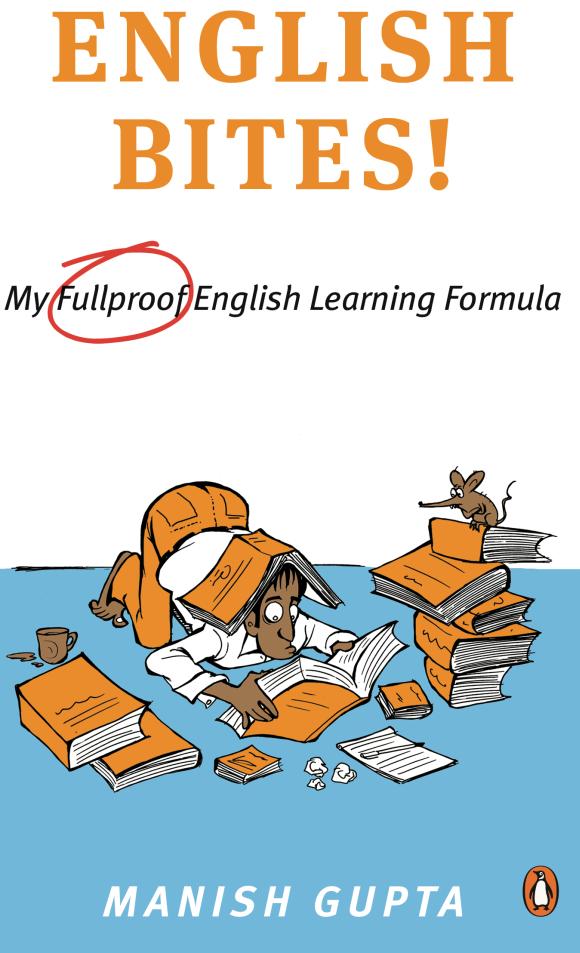Banker-turned-author Manish Gupta's book English Bites! is a unique guide to the Queen's language that will have you learning and laughing at the same time.
The last thing you'd expect to read is a book on the English language, written by an Indian banking professional who graduated from an engineering college.
But that's exactly who Manish Gupta is -- and his first published work is English Bites!, a unique guide to the language that will have you learning and laughing at the same time.
Here we bring you an excerpt from Chapter 5, The Tata Nagar Wheeler Dealer:
I am sure you are familiar with all these words and phrases but let us see if you can completely comprehend a railroad joke that I recently came across:
Two drunks were walking up an incline between the railroad tracks. One said: 'This is the longest stairway I have ever been on.' The other said: 'It's not the stairs that bother me; it's the low banister!' (Smiley)
This joke may not deserve full-throated laughter but when I first heard it I couldn't even manage a smile, since I didn't know what a banister was.

The only remotely similar thing I knew was a canister (can, container) or a barrister (a lawyer who can plead at the bar). When I checked, I found out that a banister is another name for a railing one usually finds on both sides of a staircase. Now, banister has been permanently banned from escaping my hippocampus (seat of memory in the brain).
Let me share another railroad joke that I read around the same time, and where my laughter was not stifled by my poor vocabulary:
A man and a woman, who have never met before, find themselves assigned to the same sleeping room on a train. Although initially embarrassed and uneasy over sharing a room, the two are tired and fall asleep quickly, he in the upper bunk and she in the lower. At 2 a.m., he leans over and gently wakes the woman, saying: 'Ma'am, I'm sorry to bother you, but would you be willing to reach into the closet to get me a second blanket? I'm awfully cold.' 'I have a better idea,' she replies, 'just for tonight, let us pretend that we're married.' 'Wow! That's a great idea!' he exclaims. 'Good,' she replies, 'so get your own damn blanket!' (Smiley)
Let me take you back to our earlier discussion on fenders. Do you know that even railway engines have fenders in the front? But, unlike in cars, where their purpose is to absorb any mild shock and prevent damage to the engine and to block splashing water or mud, fenders in front of railway engines have a distinct purpose. Any guesses? These fenders are used to clear the tracks of any obstructions like logs of wood, pieces of rock, and animals that stray on to the railway line. Interestingly, fenders in railway engines are also called cowcatchers, apparently in deference to the preponderance of stray cows that get caught in these fenders!
Allow me to now peep into the world of bicycles. Did you know that in one of the earliest cycles invented in Britain, the front wheel was four times larger than the rear wheel? It was named Penny Farthing, which sounds as odd as the cycle must have looked. There was indeed logic in naming this cycle and the concept was borrowed from money -- a farthing was one-fourth the amount of a penny!
Bikes also gave me a new word 'ono', which I spotted in the following advertisement in a glossy foreign magazine: Lady's bike for sale $25 ono. This word struck me as a possible misprint. I thought the correct copy should have been: Lady's bike for sale $25 only. But never to take chances after so many ego-destabilizing experiences in the past, I consulted my favourite online dictionary, www.dictionary.com. I found out that ono is definitely not a misprint but an acronym for 'or nearest offer' and used in advertisements to convey downward flexibility in the quoted price. In the above advertisement, it suggests that the owner of the bike is likely to accept a price slightly lower than 25 dollars, if no offer for 25 dollars is received.
I am sure you know that the prefix 'bi' as in bicycle means 'two, double, twice'. But then why is it that when we say biannual, it means occurring twice a year and bimonthly, once every two months? Shouldn't bimonthly also mean occurring twice in a month? We'll have to forget this discrepancy as one of the idiosyncrasies of the English language. This 'bi' is not that confusing when it comes to other words it qualifies.
Bifurcate is to divide something into two equal or unequal parts. Similarly there is trifurcation where this division is into three parts. Logically, there should be words for division of something into four, five, or six parts as well, but for lack of application these expressions have not taken off. Bipartite is something that is divided into or consists of two parts, or is shared by two (Latin partire—'to part'): a bipartite agreement or contract. Incidentally, partition (a separation or division into parts) comes from the same Latin root partire. Bipartisan means consisting of or supported by members of two parties, especially two major political parties: a bipartisan resolution to fight inflation.
Bilingual is a person who can speak two languages with equal or nearly equal ease and fluency (Latin lingua—'tongue'). People have native proficiency in one language (mother tongue) and acquired proficiency in the other, and thus most of them shall not have equal but nearly equal fluency in the second language. Bilingual also means spoken, written, or containing similar information in two different languages: a bilingual dictionary, a bilingual school, or bilingual public notices at the embassy.
English even has the word polylingual for a person who has mastery over many languages (poly—'many'). Polylingual also has linguistic company in the word polyglot (Greek glotta—'tongue'). And finally from the prefix 'bi', we get the bicameral system of government (Latin camera—'chamber') that has two chambers of legislative assembly. This system is quite popular globally and many countries (Australia, Brazil, Canada, India, US, etc. to name a few) follow it.
Before we conclude, let me share another hilarious experience with the airline that had originally piqued my curiosity to commence my research for this chapter—Cathay Pacific. The experience was hilarious but only for the airhostess. For me, it was acutely embarrassing. It all started when I ordered my first complimentary wine on my second ever international flight from Tata Nagar to Taipei (with a change from railways to airways at Kolkata and a change of plane at Mumbai).
Back then (in 1993), India was dotted with 'wine shops' that surprisingly didn't sell any or probably very little wine. The masses believed (they still do) that wine was a generic term to describe popular drinks like whisky, beer and rum. I had lifted myself up from this mass generalization but, having inherited the common Indian palate, had never tasted wine before this amazing opportunity of international travel came my way so early in my first job. The first one, as you would recollect, was spent in exchanging endearing smiles with the air hostesses of Air Lanka.
Well-heeled and hence well-travelled friends had briefed me well ahead of this scheduled trip that hard drinks are complimentary on international flights, and that I should not hesitate to ask for as many refills as I needed. Of course, I flew Cathay Pacific, the airline for a world where pirouettes take an Oriental turn. As the airhostess on the Mumbai–Taipei leg rolled the drinks trolley close to my row, I began to wave my hands excitedly to draw her attention. It was as if I were bound by a subconscious fear that hard drinks, or at least the exotic variety, would run out before she managed to reach my seat.
Years of experience of international flying must have imbued in her an ability to accurately predict if someone is a first- or second-time traveller, and who is also about to break the promise made to his mom (of never ever exceeding in a day, a glass of beer or a small peg of anything harder) and launch himself into a drinking binge. As if trying to help me keep my promise, she started off by asking if I would prefer orange or apple juice, Coke or Pepsi. I was in no mood to get tempted by such softies and asked her to give me options in hard drinks. She rattled off the names of some whiskeys, beers, vodkas and rums but my heart was fixed on trying the elusive wines. So I dismissed her list and asked for options in expensive wines.
The names of wines that she offered were not only complex to fathom (let alone remember) but left me perplexed on how to decide and, more important, how to order! By the grace of god, I quickly recollected that a little while ago, she had mentioned a red and white wine to a fellow traveller seated a few rows ahead of me. So, with colour returning to my face and confidence to my voice, I ordered a 'Red & White' wine. At first, I thought she had not heard me properly, as she did not immediately process my order. But why did her face carry a bemused (with a dash of 'shocked') look? Surely, this was not the first time in her long international flying career that someone had ordered a 'Red & White' wine?
Finally, after she had inhaled and exhaled deeply a few times, but with the bemused/shocked expression still on her face, she inquired if I wanted one glass of 'white' AND one glass of 'red' wine! Colour disappeared from my face again as I realized my folly -- the popular 'Red & White' brand of cigarettes had, after all, not yet been adopted by makers of exotic wines. But, while it abundantly showed on my face, I did not verbally express anything to suggest that I had messed up my order, and that I was not a connoisseur of fine food and vintage wine. I stuck to my instruction and drank a glass of white wine followed by a glass of red wine.
I have since bought a very thick and rather expensive book on the fine art of winemaking, with the honourable intention of unravelling the mysteries (and, more important, pronunciations) of Syrah (or Shiraz), Merlot, Cabernet Sauvignon, Malbec, Pinot Noir, Zinfandel, Sangiovese, Barbera (all reds) and Chardonnay, Sauvignon Blanc, Semillon, Moscato, Pinot Grigio, Gewurztraminer, and Riesling (all whites) wines. (Smiley)
Excerpted with kind permission from publishers Penguin Books India / Penguin: Rs 250


Comment
article